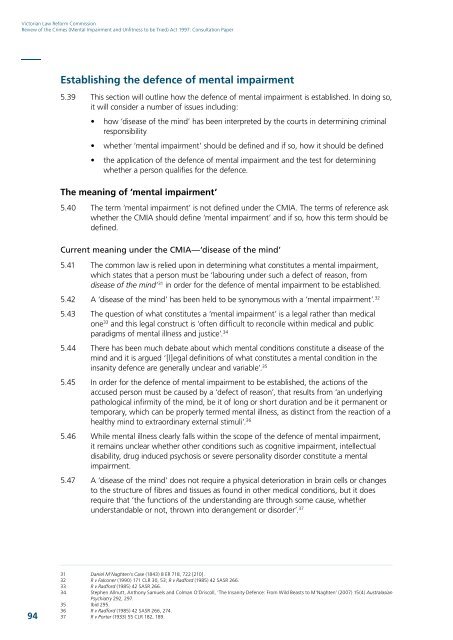Crimes Mental Impairment consultation paper.pdf - Victorian Law ...
Crimes Mental Impairment consultation paper.pdf - Victorian Law ...
Crimes Mental Impairment consultation paper.pdf - Victorian Law ...
Create successful ePaper yourself
Turn your PDF publications into a flip-book with our unique Google optimized e-Paper software.
<strong>Victorian</strong> <strong>Law</strong> Reform Commission<br />
Review of the <strong>Crimes</strong> (<strong>Mental</strong> <strong>Impairment</strong> and Unfitness to be Tried) Act 1997: Consultation Paper<br />
Establishing the defence of mental impairment<br />
5.39 This section will outline how the defence of mental impairment is established. In doing so,<br />
it will consider a number of issues including:<br />
• how ‘disease of the mind’ has been interpreted by the courts in determining criminal<br />
responsibility<br />
• whether ‘mental impairment’ should be defined and if so, how it should be defined<br />
• the application of the defence of mental impairment and the test for determining<br />
whether a person qualifies for the defence.<br />
The meaning of ‘mental impairment’<br />
5.40 The term ‘mental impairment’ is not defined under the CMIA. The terms of reference ask<br />
whether the CMIA should define ‘mental impairment’ and if so, how this term should be<br />
defined.<br />
Current meaning under the CMIA—‘disease of the mind’<br />
5.41 The common law is relied upon in determining what constitutes a mental impairment,<br />
which states that a person must be ‘labouring under such a defect of reason, from<br />
disease of the mind’ 31 in order for the defence of mental impairment to be established.<br />
5.42 A ‘disease of the mind’ has been held to be synonymous with a ‘mental impairment’. 32<br />
5.43 The question of what constitutes a ‘mental impairment’ is a legal rather than medical<br />
one 33 and this legal construct is ‘often difficult to reconcile within medical and public<br />
paradigms of mental illness and justice’. 34<br />
5.44 There has been much debate about which mental conditions constitute a disease of the<br />
mind and it is argued ‘[l]egal definitions of what constitutes a mental condition in the<br />
insanity defence are generally unclear and variable’. 35<br />
5.45 In order for the defence of mental impairment to be established, the actions of the<br />
accused person must be caused by a ‘defect of reason’, that results from ‘an underlying<br />
pathological infirmity of the mind, be it of long or short duration and be it permanent or<br />
temporary, which can be properly termed mental illness, as distinct from the reaction of a<br />
healthy mind to extraordinary external stimuli’. 36<br />
5.46 While mental illness clearly falls within the scope of the defence of mental impairment,<br />
it remains unclear whether other conditions such as cognitive impairment, intellectual<br />
disability, drug induced psychosis or severe personality disorder constitute a mental<br />
impairment.<br />
5.47 A ‘disease of the mind’ does not require a physical deterioration in brain cells or changes<br />
to the structure of fibres and tissues as found in other medical conditions, but it does<br />
require that ‘the functions of the understanding are through some cause, whether<br />
understandable or not, thrown into derangement or disorder’. 37<br />
94<br />
31 Daniel M’Naghten’s Case (1843) 8 ER 718, 722 [210].<br />
32 R v Falconer (1990) 171 CLR 30, 53; R v Radford (1985) 42 SASR 266.<br />
33 R v Radford (1985) 42 SASR 266.<br />
34 Stephen Allnutt, Anthony Samuels and Colman O’Driscoll, ‘The Insanity Defence: From Wild Beasts to M’Naghten’ (2007) 15(4) Australasian<br />
Psychiatry 292, 297.<br />
35 Ibid 295.<br />
36 R v Radford (1985) 42 SASR 266, 274.<br />
37 R v Porter (1933) 55 CLR 182, 189.

















